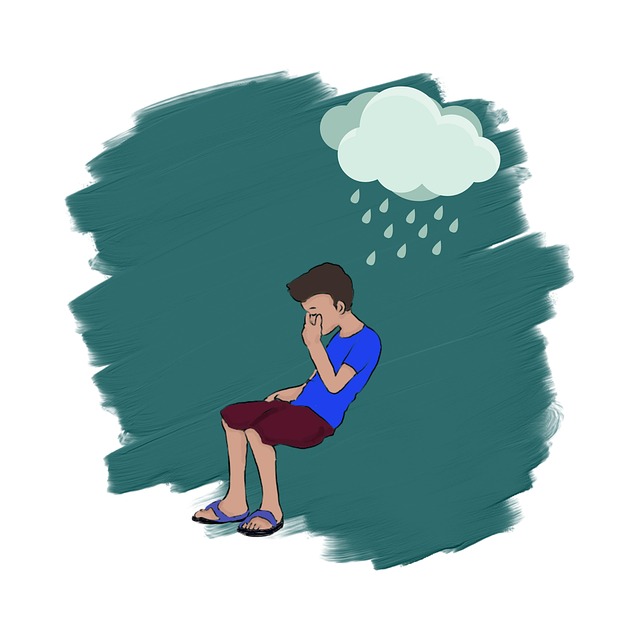Young children's anxiety is a complex issue influenced by environmental factors, genetic predisposition, and life experiences. Subtle signs like irritability, restlessness, tantrums, or physical symptoms require early recognition for effective intervention. Triggers can include trauma, high expectations, lack of coping strategies, and sensory sensitivities. Solutions include mental wellness coaching, crisis intervention guidance, CBT techniques (identifying & changing negative thoughts), mindfulness practices, relaxation techniques, emotional healing journaling, tailored risk management planning, and parental involvement. Integrating evidence-based techniques at home strengthens children's inner strength and stress management skills, enhancing therapy's effectiveness for therapy for young children anxiety.
“In addressing the urgent need for effective crisis intervention strategies, this comprehensive guide delves into the complex world of young children’s anxiety. From understanding the underlying causes and recognizing subtle symptoms, to implementing evidence-based techniques like cognitive-behavioral therapy and mindfulness practices, each section equips caregivers with vital tools.
Learn how creating safe, trusting environments and fostering parental involvement can revolutionize therapy for young children anxiety, ultimately guiding them towards healthier, more resilient futures.”
- Understanding Young Children's Anxiety: Causes and Symptoms
- Creating a Safe Space: Establishing Trust and Connection
- Cognitive-Behavioral Techniques: Teaching Coping Skills
- Mindfulness and Relaxation Strategies for Calming Anxious Minds
- Parent/Caregiver Involvement: Supporting and Enabling Effective Intervention
Understanding Young Children's Anxiety: Causes and Symptoms

Young children’s anxiety is a complex issue that can stem from various sources, including environmental factors, genetic predisposition, and life experiences. It’s essential to recognize that anxiety in this age group often manifests differently than in adults. Children may express their anxiety through irritability, restlessness, frequent tantrums, or even physical symptoms like stomach aches and sleep disturbances. Understanding these subtle signs is crucial for early intervention, which can prevent the development of more severe mental health issues later in life.
The causes of young children’s anxiety are multifaceted. Trauma, such as a recent move or the loss of a loved one, can trigger anxiety disorders. Additionally, high expectations from parents or peers, a lack of coping strategies, and even certain sensory sensitivities can contribute to a child’s anxiety. Mental wellness coaching programs and crisis intervention guidance can play a vital role in addressing these challenges. Compassion cultivation practices have also shown promise in helping young children manage their emotions and reduce anxiety symptoms.
Creating a Safe Space: Establishing Trust and Connection

Creating a safe space is an essential foundation for crisis intervention with young children experiencing anxiety. This involves establishing a calm and non-judgmental environment where the child feels trusted and supported. In therapy sessions, this can be achieved through warm and empathetic interactions, ensuring the child’s privacy and confidentiality, and using child-friendly language to help them express their feelings. The therapist should also incorporate techniques like deep breathing exercises or sensory tools to create a soothing atmosphere, facilitating better communication and allowing the child to open up about their anxieties.
Building trust is crucial in this process. Therapists can achieve this by demonstrating cultural sensitivity in mental healthcare practice, respecting the child’s background, beliefs, and family dynamics. Using age-appropriate activities and play therapy methods can also help create a connection and make sessions more engaging for young clients. By fostering a strong therapeutic alliance, children are more likely to feel comfortable sharing their fears and working through anxiety relief strategies, which ultimately enhances the effectiveness of crisis intervention.
Cognitive-Behavioral Techniques: Teaching Coping Skills

Cognitive-Behavioral Techniques (CBT) are powerful tools for teaching young children coping skills during crisis intervention. By focusing on identifying and changing negative thought patterns, CBT empowers kids to manage anxiety effectively. Therapists can guide children to recognize triggers, challenge distorted thinking, and replace them with more realistic, positive thoughts. This process helps in reducing anxiety symptoms and building resilience.
Incorporating self-care routine development as part of therapy for young children with anxiety is a key aspect of CBT. Teaching kids techniques like deep breathing exercises, progressive muscle relaxation, and mindfulness practices enables them to take charge of their emotional well-being. Additionally, promoting healthy habits such as regular physical activity, adequate sleep, and balanced nutrition supports depression prevention and overall mental health.
Mindfulness and Relaxation Strategies for Calming Anxious Minds

Anxiety can be overwhelming for young children, but mindfulness and relaxation strategies offer powerful tools to help them navigate their emotions. Simple techniques like deep breathing exercises, guided visualizations, or even gentle yoga can significantly calm anxious minds. These practices encourage children to focus on the present moment, quieting racing thoughts and reducing stress responses. For instance, teaching a child to recognize and breathe slowly through anxiety-inducing situations can empower them to self-regulate during moments of distress.
Incorporating emotional healing processes into daily routines is key. Encouraging young clients to keep a mental wellness journal, for example, allows them to express and process their feelings creatively. This form of self-reflection can be an effective mental wellness journaling exercise guidance for professionals supporting children with anxiety. Additionally, risk management planning should be tailored to each child’s unique needs, ensuring they have strategies in place to manage anxiety triggers effectively.
Parent/Caregiver Involvement: Supporting and Enabling Effective Intervention

In crisis intervention strategies, involving parents or caregivers is a critical component that can significantly enhance the effectiveness of therapy for young children experiencing anxiety. When parents are actively engaged and empowered to support their child’s emotional well-being, it fosters a collaborative environment that strengthens the entire intervention process. This involvement enables caregivers to understand and apply evidence-based techniques, such as those used in therapy for young children with anxiety, consistently at home. By integrating these strategies into daily routines, parents can help their children develop inner strength and better manage stressful situations.
Emotional regulation is a key area where parent involvement makes a profound difference. Caregivers can teach children healthy coping mechanisms by modeling self-care routine development for better mental health. Through open communication and shared learning, families create a safe space to discuss emotions, fostering resilience and empowering young individuals to navigate crises with growing confidence. This supportive network not only reinforces the therapy’s impact but also ensures that the child receives consistent care, ultimately contributing to their long-term emotional regulation and overall well-being.
Crisis intervention strategies, especially those tailored for young children experiencing anxiety, are vital tools in fostering their emotional well-being. By understanding the root causes and symptoms of anxiety in this demographic, we can create safe spaces that build trust and connection. Implementing evidence-based techniques like cognitive-behavioral therapy and mindfulness practices equips children with effective coping skills to manage anxiety. Furthermore, parental involvement plays a crucial role in enhancing these interventions, ensuring long-lasting positive outcomes for the child’s mental health journey. Effective crisis intervention thus becomes a collaborative effort between caregivers and professionals, offering hope and support for young minds grappling with anxiety.










